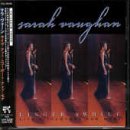Fantastic album features Vaughan in both 1957 and 1982.
Mary Whipple | New England | 08/26/2005
(5 out of 5 stars)
"In 1999, Pablo Records released a unique album featuring eight, previously unissued tracks recorded by Sarah Vaughan at the Newport Jazz Festival in 1957, and another eight tracks, also unissued, recorded in studios between 1978 and 1982. This is a copy of that recording. In 1957, Vaughan was a young, 33-year-old megastar; in 1982, she was a mature jazz singer who had seen it all. Though Vaughan's voice remains a wondrous instrument at both stages of her career, the changes over the course of twenty-five years are astonishing. With the "two voices" side by side on this album, lovers of Sarah Vaughan can see for themselves how a young singer whose high range soared into the stratosphere developed into a mature, husky-voiced jazz singer famous for her lower range.
In the early songs, Vaughan sounds young, lively, and excited to be in Newport. With simple accompaniments provided by Jimmy Jones on piano, Richard Davis on bass, and Roy Haynes on drums, she has fun with standards, singing "The Masquerade is Over" as a moody, sad song, and wailing at the end, and "Black Coffee" in slow, bluesy tempo, vamping with her lovely vibrato. In "Poor Butterfly," one of her signature songs, she plays with the melody, changing keys, slowing the tempo, and paying particular attention to the narrative, and on "Linger Awhile" and "Sometimes I'm Happy," she is up and down and all over her range (missing one high note in the latter song), her voice so high she sounds more like Ella Fitzgerald than the deep-voiced Sarah Vaughan of her later career.
The remaining eight songs, from 1978 - 82, are alternate versions of songs for which other versions became the master recordings. These are in no way inferior--just different--and "I Got It Bad," recorded here originally for the "Duke Ellington Songbook," is the best version of that song I've ever heard. Here Sarah sounds as if she's been through it all, her voice huskier, smokier, and altogether bigger. She soars and dips, is jazzier, more confident, and more powerful. She holds her own against solos on trumpet, sax, and piano, which parallel her own jazz interpretations.
On "I Let a Song Go Out of My Heart," she improvises. On "I'm Just a Lucky So and So," she is ironic, giving a bluesy interpretation and wailing at the end. In "Teach Me Tonight," she is playful and sexy, and in "Just Friends," she sings scat in concert with a saxophone. A unique album, this shows Sarah's career from beginning to end--glorious any way you look at it. Mary Whipple
"


 Track Listings (16) - Disc #1
Track Listings (16) - Disc #1